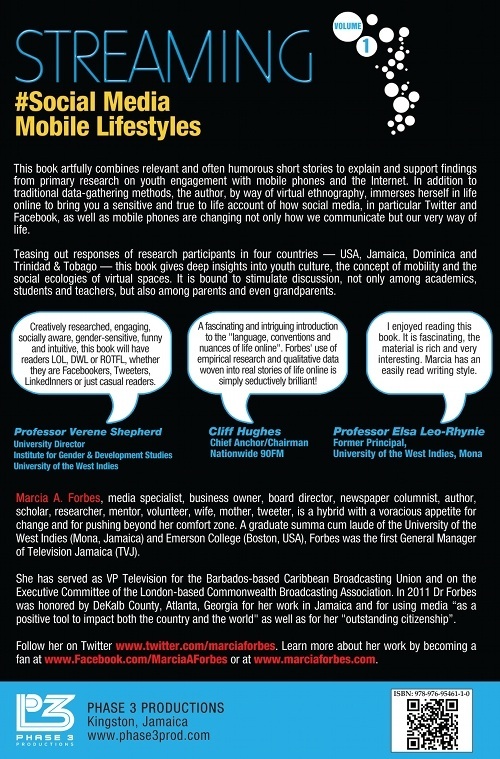STREAMING: Volume 1; #Social Media, Mobile Lifestyles, written by Dr Marcia Forbes, analyses the responses from research participants in four countries – Jamaica, Dominica, USA and Trinidad – to give deep insights into youth culture, the concept of mobility and the social ecologies of virtual spaces.
The following is the latest in a series of excerpts from Dr Marcia Forbes’ new book, “Streaming: Social Media, Mobile Lifestyles,” published in Caribbean Journal.
Mobile Lifestyle Goes Global
Previously I posited that in countries around the world people are embracing a mobile lifestyle. Naomi Baron, in looking at “language in an online and mobile world,” indicated from as far back as 2008 that more than one-third of the world’s population was using mobile phones.[i] Jamaica is one example, even in the face of its dismally low household internet penetration level of 15.6 percent,[ii] the people have latched on to mobile phones.
Admittedly though, based on data gathered by the Statistical Institute of Jamaica on behalf of the University of the West Indies and released in early 2011, about 42 percent of individuals in this island reported having access to the Internet.[iii] The work place, internet cafes, friends’ homes and other locations provide opportunities for this.
What Jamaicans lack in household internet access, they somewhat make up for via the abundance of cell phones which, depending on the type of phone, bestows varying aspects of a mobile lifestyle. As at December 2011, mobile phone penetration in this developing country was more than 110 percent. Reputable sources say smartphones account for only about 10 percent of this. Getting the exact percentage is like “pulling teeth without anesthetic.”
Still, even if not a smartphone, in Jamaica access to a cell, as it’s called in this island, confers “unadulterated blessings,”[iv] as Dunn (2008) notes. Many of these relate to the aforementioned “re-adjustments” in class and social relationships. Armed with a cell phone, many micro-enterprise owners can now conduct business without having to reveal an address to their clients. It is well-known in Jamaica that certain addresses are discriminated against. This can be as a result of the political connections tied to particular locations, the state of abject poverty of these areas and or their reported levels of crime and violence, among other features.
It is not altogether surprising, therefore, that in the face of severe economic hardships and hunger, some participants in Dunn’s study indicated that they would choose owning a cell phone over food. This goes beyond the Brits choosing Facebook over flush toilets, as mentioned earlier, since food is basic for survival. For many Jamaicans, so too is the cell phone. The instrumentality of the phone in the search for food and other life necessities were highlighted by poor Jamaicans in Dunn’s study.
This book, the first of a two part series, is available in hard copy as well as various eBook formats. Download your Kindle copy here. STREAMING is also available by clicking here.
[i]Baron, Naomi. (2008). Always On: Language in an Online and Mobile World. Oxford University Press.
[ii] Dunn. Hopeton. (2011). Caribbean ICT Indicators and Broadband Survey – Jamaica Report. Telecommunications Policy & Management Programme. Mona School of Business. University of the West Indies,
[iii]Ibid
[iv]Dunn, H. (April 2008). “Wha’ a Gwaan?”. DIRSI (Dialogo Regional sobre Sociedad de la Informacion).
